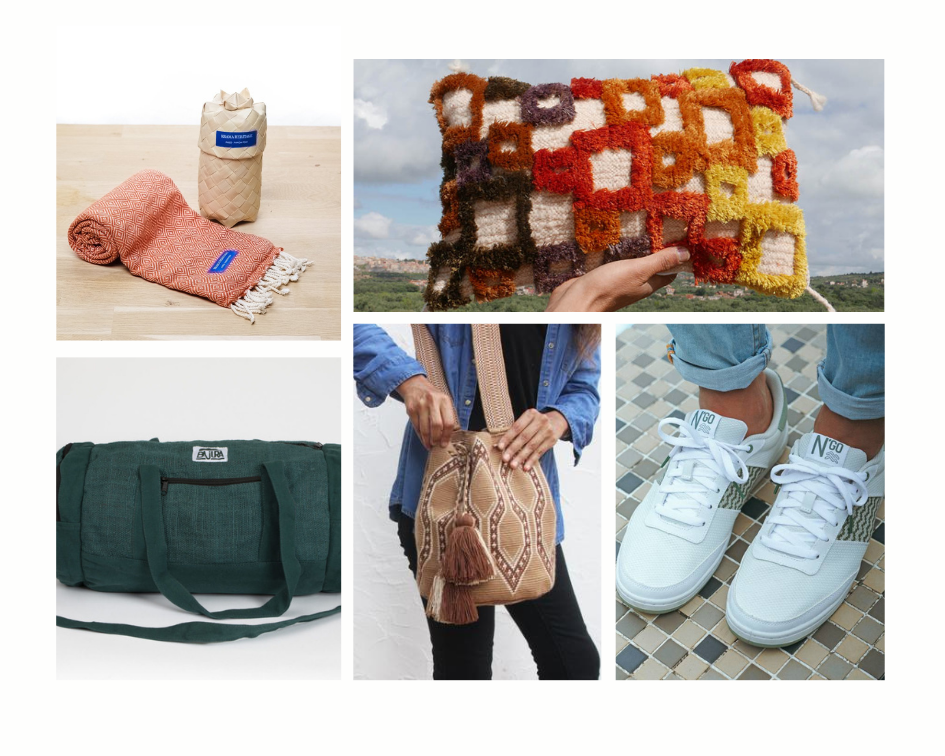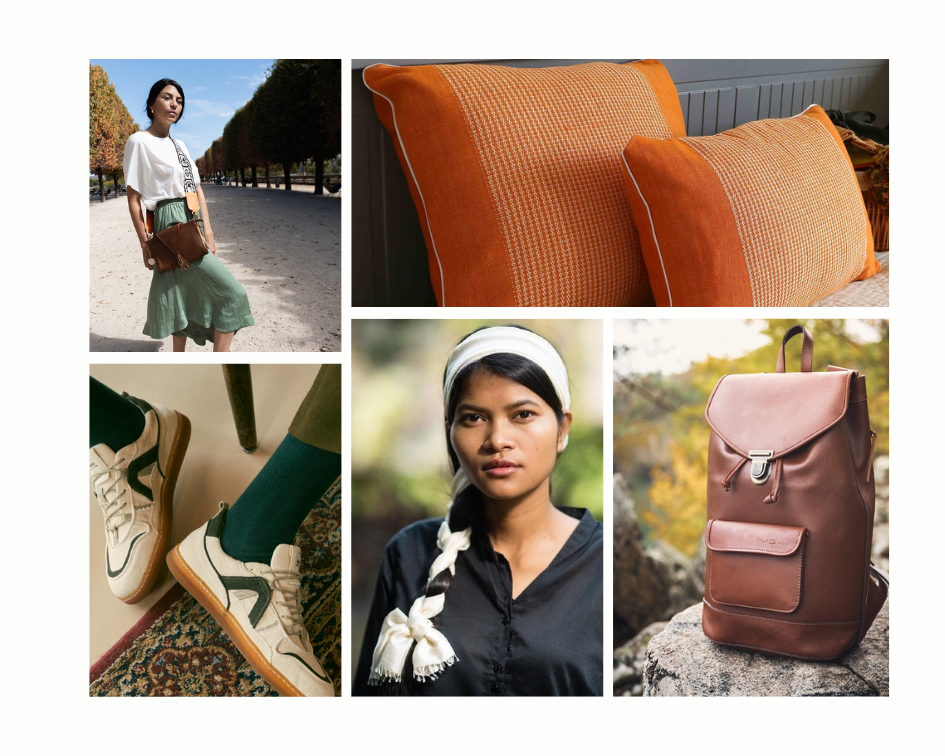Oh happiness, oh joy! There are more and more ethical brands, and some of them support craftsmanship. Something to delight the most demanding among us. On the other hand, it becomes a little more difficult to find your way around the diversity of eco-responsible brands that are flourishing at the moment. So, we thought it was time to share our little (big) favorites with you. Here is theselection made by Aude, the founder of MUUDANA, of 10 ethical brands that promote craftsmanship around the world, and why it is essential to preserve it. Follow the leader !
Preserving craftsmanship: why is it important for the planet?
MUUDANA's primary mission is to promote and preserve Southeast Asian craftsmanship, because it was there that Aude, the founder of MUUDANA, fell in love with traditional fabrics. However, as you can imagine, this craft is not the only one in danger. At issue: the well-known phenomenon of globalization, and the standardization of cultures that accompanies it. In short: all the heritage, values and history of different cultures are in danger of disappearing. We are therefore facing a real problem of loss of identity.
While you can still find handmade clothing and accessories from traditional crafts in many countries, they are little by little being replaced by cheaper items and requiring less work. Artisans with ancestral know-how therefore tend to disappear, abandoning their customs in favor of clothing from the Westand often second-hand.
Thus, supporting and preserving craftsmanship means supporting the richness of cultures. It is allowing artisans to make a decent living from their work, using their local resources. It means encouraging a vision of society where people can continue to live according to a model that is generally much more respectful than our Western lifestyles. .
Without further ado, here is the selection made by Aude from MUUDANA of 10 ethical brands that encourage craftsmanship around the world:

Bajura, ecological hemp bags
It’s the meeting of Paul, Nicolas, and a Nepalese friend in Kathmandu. Fortunately, for us, this story is not the start of a (bad) joke, but of Bajura and its Nepalese bags, conquering the European market. But not in all conditions: “The best reason to start a business is to create meaning, to create a product or service that helps improve the world” are their words. To do this, the ethical brand is committed to ensuring fair wages for its artisans, non-racial or sexual discrimination, and applies fair trade regulationswhile waiting to obtain this certification. In addition, part of the price of the product goes to one of the 3 Nepalese associations carefully selected by Bajura. In terms of ecological impact, the ethical brand chooses to make its bags using hemp, the preferred material when it comes to eco-responsibility. Their accessories are handmade, combining traditional Nepalese know-how and European style. The fabric scraps are then recovered by Bajura's partners to manufacture items for the local market, and which pushes the responsibility approach to waste management, which represents a major problem in the textile industry.
What we like: The strength and durability that the use of hemp allows. The desire to preserve and share the crafts of Nepal. The diversity of products offered: backpack, tote bag, pouch and travel bag make up the Bajura collection and which allows you to find the ethical accessory that suits our style.
Traveling embroiderer, durable and embroidered pouches
The concept of Brodeuse Voyageuse is above all about meetings. Meetings between Camille Bertrand, the founder, and craftswomen from China and embroiderers from Morocco, more precisely. Then, collaborations between these different women, through different associations, to promote these crafts and traditional textile techniques. strong>. From this exchange, accessories with unique know-how are born, a mixture of tradition and new skills acquired during this collaboration. So we get colorful clutches, stoles with natural dyes and colors to die for and cushions(oh, those wonderful cushions!)with woven patterns.
What we like: The human values behind Brodeuse Voyageuse. The exchange between these women from here and elsewhere to promote craftsmanship. And the cushions (we can never say this enough).
Krama Heritage, handmade silk scarves
Krama Heritage is an ethical brand committed to Cambodia, and specialized in scarves (hence the name “Krama”, a cultural scarf worn for centuries in Cambodia). The brand is supported by a social project, that of One Scarf, One Skill, based on three pillars: ethics, economic development and the preservation of Cambodia's artisanal heritage. Thus, the brand guarantees a decent salary, dignified and respectful working conditions and pace, and social and food benefits for weavers. workshops with which it partners(and that’s all we ask of a brand!). The responsible brand offers, in addition to its silk scarves, ethical espadrilles and 100% cotton masks!
What we like: Its social commitment and the promotion of traditional Cambodian know-how. The modern touch it brings to the traditional accessory and its wide variety of products. Its ethnic patterns and the quality of the weaving of its scarves.
Mazonia, colorful and woven accessories
Another eco-responsible brand driven by collaborations between women is Mazonia. Jeanne, the founder, takes us to Colombia, to meet the weavers of the Wayuus people and their crafts. Their unique know-how is passed down from generation to generation, from mother to daughter. The patterns of the accessories they make represent their history, their life path and the whole nature that surrounds them. All this is beautifully transmitted to us without intermediary, through jewelry, colorful bags and woven pouches from Mazonia. All Native American crafts just a click away.
What we like: The variety of colors and weaves, shapes and fabrics. Support for Colombian weavers. The large collection of jewelry that allows you to accessorize any outfit.
Ngo Shoes, ethical and sustainable sneakers
“These boots are made for walkin’, and that’s just what they’ll do, one of these days these boots are gonna walk all over you” sang Nancy Sinatra. If the song were adapted today, Nancy would probably be talking about sneakers. Having gone from being sports shoes to being adopted by the greatest number of people, we find sneakers everywhere. If they are closely linked to the use of rubber, N'Go Shoes twists this postulate by associating natural rubber with natural materials such as sawdust or recycled materials, such as plastic bottles. Made in Vietnam, these ethical sneakers promote Vietnamese craftsmanship, while favoring locally sourced, recycled or even vegan components. But the ambition of the founders, Kevin and Ronan, goes beyond sneakers, since the brand also offers backpacks, designed to last; like their ethical brand that we haven’t heard enough about.
What we like: Their continuous improvement approach. Their constant efforts on the choice of recycled and vegan materials. Their ever more eco-responsible and supportive accessories. The promotion of craftsmanship in ethical and modern shoes. And obviously, the little hand-crafted Vietnamese touch.

Pachamama bags, handmade Bolivian bags
It’s all Bolivian craftsmanship in a bag. Born from a trip to South America, Juliette and Gaétan's brand aims to promote the traditional know-how of Bolivia. Through its bags handmade in Bolivia, Pachamama Bags is committed to respecting workers and the environment. Their ethical and modern bags, while retaining a characteristic Bolivian ethnic touch, can accompany you on all your trips and other (more or less) urban walks!
What we like: The promotion of Bolivian fabrics and Andean craftsmanship, through practical accessories adapted to our modern life thanks to their different models, ranging from backpacks to the weekend bag, including the tote bag.
Mekong Silk, solidarity silk scarves
“Behind every scarf, a women’s story”. This is how Soierie du Mékong presents itself. This social and solidarity project is a project of the NGO Enfants du Mékong , which has been working since 1958 for the education of the poorest in Southeast Asia. The initial objective of the brand? Reviving the exceptional art of silk weaving For enable women in very precarious situations to find meaning in their lives and build a future for their family . This commitment is therefore found in the making high quality silk scarves and scarves . From the choice of material, to the finishes, including weaving and dyeing, Soierie du Mékong perpetuates the traditional and ancestral know-how of Cambodia. By training its own weavers, the ethical brand guarantees well-being of these women , their working conditions, the quality of its products and the safeguarding of the traditional art of weaving.
What we like: The social approach. Commitment to women and their training. Preserving Cambodian craftsmanship in ethical silk scarves of exceptional quality. The fact that all profits are donated to the NGO Enfants du Mékong.
TrendEthics, woven and eco-responsible cushions and accessories
It’s not just great cushions with bright colors and pretty weaves. It is above all an association acting for the environment, employment and education. Raw materials selected to minimize the impact on the planet, hand weaving by artisans from South Asia Est, job creation for women and support for ethnic minorities, highlighting their know-how… The impact is great for humans, and not for the planet! All this commitment is found in their eco-responsible accessories, ranging from cushions to pouches. The small (big, in reality) +: if the fabrics are woven in Asia to valorize the work of women in precarious situations and knowledge -traditional, it is in a reintegration workshop in Seine Saint Denis that the fabrics are assembled into cushions.
What we like: The approach committed to preserving Southeast Asian crafts, the support for cooperatives and women and finally the quality of the products and colorful weaving bright colors that become the centerpiece of our living rooms.
Umoja, ethical and plant-based shoes
Umoja's ambition is (almost) simple, in the very complex world of the textile industry: find green solutions and alternatives to meet the challenges of this industry, while preserving African traditional and artisanal know-how. All of its expertise can be found in its ethical (and plant-based!) sneakers, combining African textile craftsmanship and biodegradable and biosourced materials and traditional Portuguese techniques. Indeed, although many West African countries are producers of quality raw materials, they unfortunately do not (or no longer) have an industry capable of processing them locally. To safeguard African craftsmanship, the brand chooses to associate them with European know-how: their plant-based sneakers are therefore rich in a mixture of tradition and modernity. This aspect is also found in the look of ethical shoes: perfectly adapted to today's world, with a little ethnic touch that makes them recognizable.
What we like: Craftsmanship serving innovation to meet the challenges of the textile industry. The fact that Umoja offers 100% plant-based, 0% plastic sneakers. Modern design and natural colors. The preservation of traditional African know-how.
Yacana, ecological alpaca scarves and accessories
The founder of Yakana, Aurore, takes us on a detour to Latin America through her brand. To make its accessories, Yakana calls on the traditions and craftsmanship of Peru and Uruguay to bring them up to date in scarves, leather goods or even decorative objects. They are made by hand using traditional know-how and using raw and natural materials. His particuliarity ? The use of Alpaca wool, soft and ecological!
What we like: The reinterpretation of traditions in techniques, in fabrics. Promoting Latin American craftsmanship with a contemporary and fun approach. Without forgetting its embroidered cushions.
